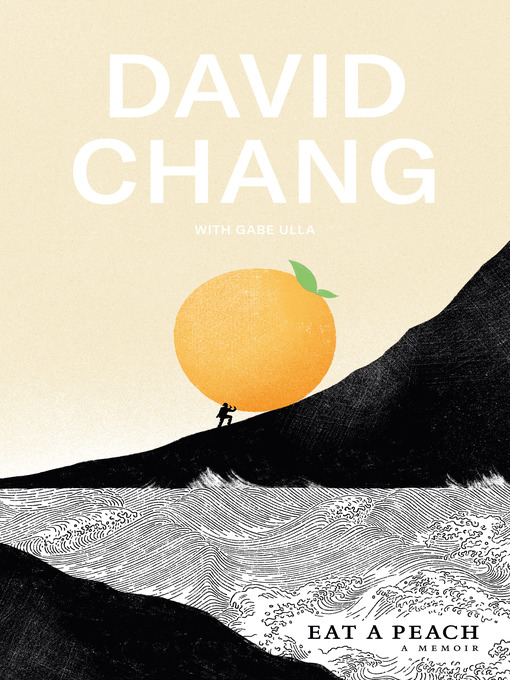
Eat a Peach
A Memoir
کتاب های مرتبط
- اطلاعات
- نقد و بررسی
- دیدگاه کاربران
نقد و بررسی

Starred review from June 29, 2020
Chang (Momofuku), Momofuku restaurateur and star of Netflix’s Ugly Delicious, starts this self-effacing, heart-on-sleeve memoir with a disclaimer: “Frankly, I just don’t understand my appeal.” Chang writes about being a hard-driving Korean-American kid with an anger problem who channeled his frustrations into an eagerness to test limits and himself. He left a “soul-sucking” post-college finance job after discovering that, though he was far from a natural at cooking, it was something he “didn’t hate doing.” He opened his first restaurant, Momofuku Noodle Bar, in the East Village in 2004 at least partially to stave off suicide, and in the course of becoming an international restaurateur, Chang tried to upend people’s expectations of ethnic culinary categories while pushing himself to the financial and emotional brink. Chang writes about the sweaty tension of his manic episodes and his dark depression, and there are stories of kitchen screaming fits, reflections on being in the “cool chefs club,” and particularly affecting passages about Chang’s late friend, Anthony Bourdain. In the book’s most heartfelt section, Chang rhapsodizes about the egalitarian Asian dining ethos he wanted to import to the West and even allows himself a rare pat on the back for his influence (“Food across the country had become porkier, spicier, brighter, better”). Foodies and chefs alike will dig into Chang’s searing memoir.

July 15, 2020
The debut memoir from the star chef and restaurateur. It would be unfair to label Chang's book as the Korean American Kitchen Confidential, but the similarities in tone and attitude certainly invoke the late Anthony Bourdain. The author, probably best known for his now-global Momofuku culinary brand, is no slouch as a writer, with a style that features a refreshingly defiant attitude and some of the best inessential footnotes since A Heartbreaking Work of Staggering Genius. Chang whisks readers through the steps it takes to be a successful restaurateur, and he makes it clear that there are few ventures harder to pull off. During his first years in the restaurant trade, the author was the beneficiary of family money, a fact that he is not ashamed to admit: Chang's father gave him a generous loan for the financial foundations of his series of restaurants. "There were no apologies or heartfelt conversations, only the money and the particulars of starting a business," he writes. "[My father] was vulnerable. I was vulnerable. We were leaning on one another, just as a family might." Following his early success, Chang began making TV appearances (he now has his own show on Netflix). Of course, there's always a price for success. After moving to Australia and opening a restaurant, he began to feel the stress of managing his many global culinary assets, and a hepatitis scare in one of his restaurants put his business in danger. There's also the inevitable chapter on his addictions: The author was a heavy drinker for years, and he also struggled with anger issues. Chang's memoir eventually becomes a smorgasbord of random recall, covering everything from contemplating the ideal volume of the music in his restaurants to his extended bouts with depression and anxieties about his open-ended future in food. An entertaining, admirably candid self-assessment of life in the foodie fast lane.
COPYRIGHT(2020) Kirkus Reviews, ALL RIGHTS RESERVED.

August 1, 2020
Throughout his first memoir, chef, restaurateur, and Ugly Delicious host Chang (Momofuku: A Cookbook) never loses sight of the "monumental weirdness" of writing a book about himself. While he discusses his upbringing in a Korean American family with poignance, particularly his relationship with his father, this is primarily a book about Chang's career and mental health, and how the two are intertwined. After some post-college searching that led to culinary school, in the early aughts he opened Momofuku Noodle Bar in Manhattan's East Village. One restaurant became several, with accolades and new opportunities aplenty. But Chang is just as open about professional missteps as successes, lauding his talented team while never sparing himself criticism. He also applies brave transparency to the realities of coping with his bipolar disorder, and battling suicidal thoughts. Culinary-minded readers will find much instruction here (including a section on "33 rules for becoming a chef"), as well as the intimate self-portrait of a chef who works hard not to be at the top of his game, but instead always growing.(Reprinted with permission of Booklist, copyright 2020, American Library Association.)

October 1, 2020
Chang is a big name in the culinary world. From Momofuku and his other restaurants, to the gone-too-soon magazine Lucky Peach, to the popular Netflix show Ugly Delicious, his star has continued to rise, despite the occasional setback. Is it luck? Hard work? Tenacity? Yes, to all that and more. Chang's memoir wrestles with those questions and the feelings of inferiority, rage, and depression that have plagued him all his life, from his time first working in kitchens to success as a restaurateur to becoming a father. He is as open about his life with bipolar disorder and struggle with self-destructive impulses as he is in describing the missteps he made while managing the Momofuku empire. This openness about the business side of the culinary world makes for a compelling read, even as readers might wince at some of Chang's self-excoriation. He closes the book with a list of 33 Rules for Becoming a Chef; anyone considering the life would do well to read it before getting started. VERDICT A solid choice for memoir fans and chef-followers alike.--Devon Thomas, Chelsea, MI
Copyright 2020 Library Journal, LLC Used with permission.

























دیدگاه کاربران